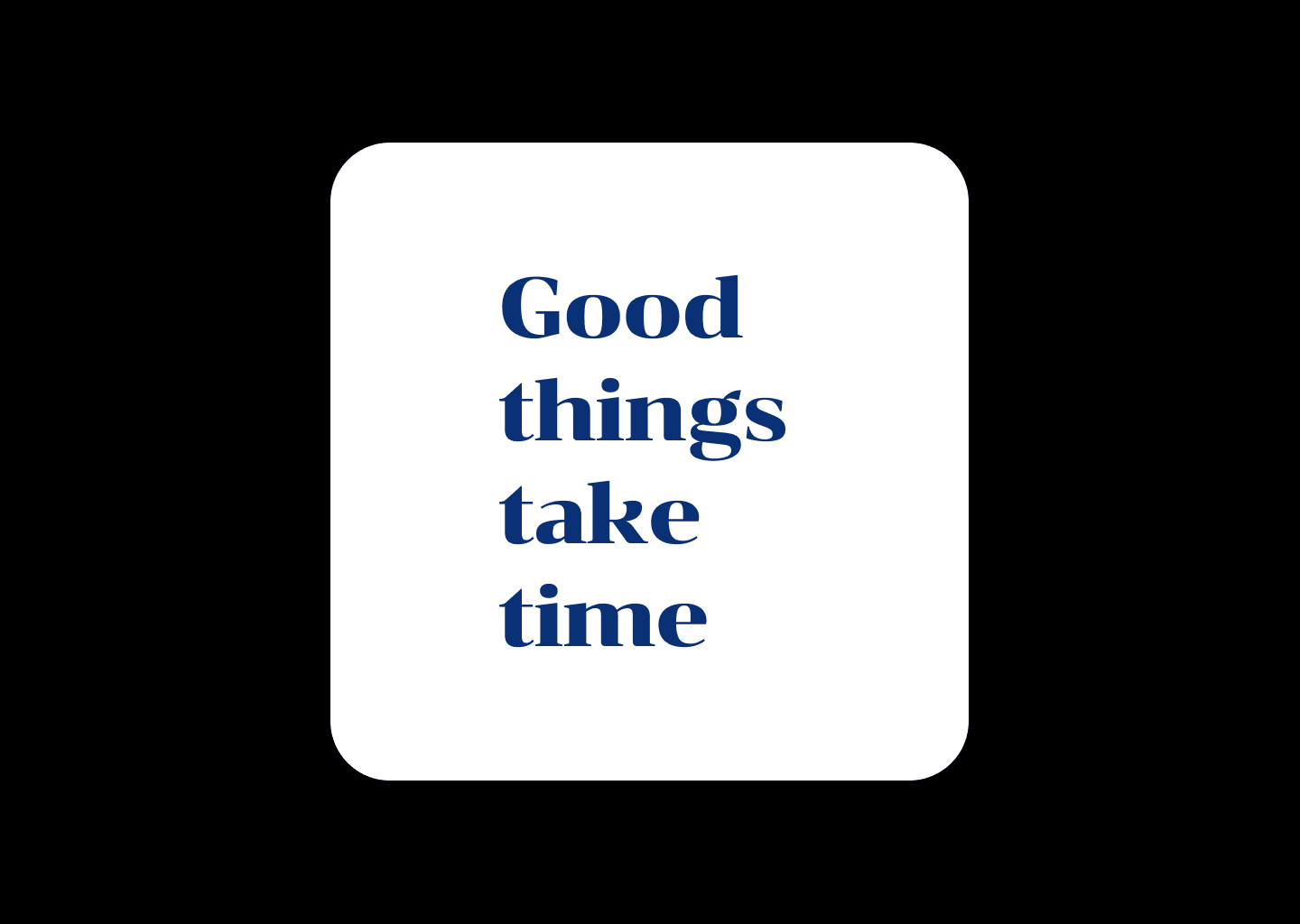
"Good things take time" is a reminder that significant achievements regularly require patience, persistence, and commitment. In an international pushed via way of means of on-the-spotaneous gratification, we`re tempted to seek brief results, however, the truth is that lasting fulfillment is hardly ever constructed overnight. When we take time to nurture our goals, expand our skills, and develop through the journey, the rewards tend to be deeper, more fulfilling, and enduring.

Think of personal development as an example. Gaining knowledge, boosting self-esteem, and creating lasting connections are all incremental processes. We require time to establish a solid foundation in life, much like a tree needs time to develop deep roots before blossoming. Rushing this procedure frequently produces short-lived, superficial outcomes. Without the resiliency and insight that comes from real experience, quick success can quickly evaporate.
When we embrace the idea that good things take time, we learn to appreciate small milestones along the way. These milestones remind us that growth is happening, even if the result isn’t immediately visible. This approach also teaches us the importance of resilience and perseverance. Every setback becomes an opportunity to learn, and every challenge makes us stronger.
Patience itself is an ability that can pay off. People who apprehend the fee of time are frequently extra organized to stand lifestyles' inevitable ups and downs. They`re capable of making thoughtful, well-knowledgeable choices instead of impulsive ones. Praise is a lifestyle constructed with intention, depth, and purpose.
In the end, waiting for good things cultivates not only patience but also gratitude. When we finally reach our goals, the sense of accomplishment is richer because we’ve invested time, energy, and heart. So, trust the process, stay dedicated, and remember good things take time, and they’re worth every moment spent on the journey.
How Small Steps Lead to Big Rewards
The Art of Patience in Skill Building
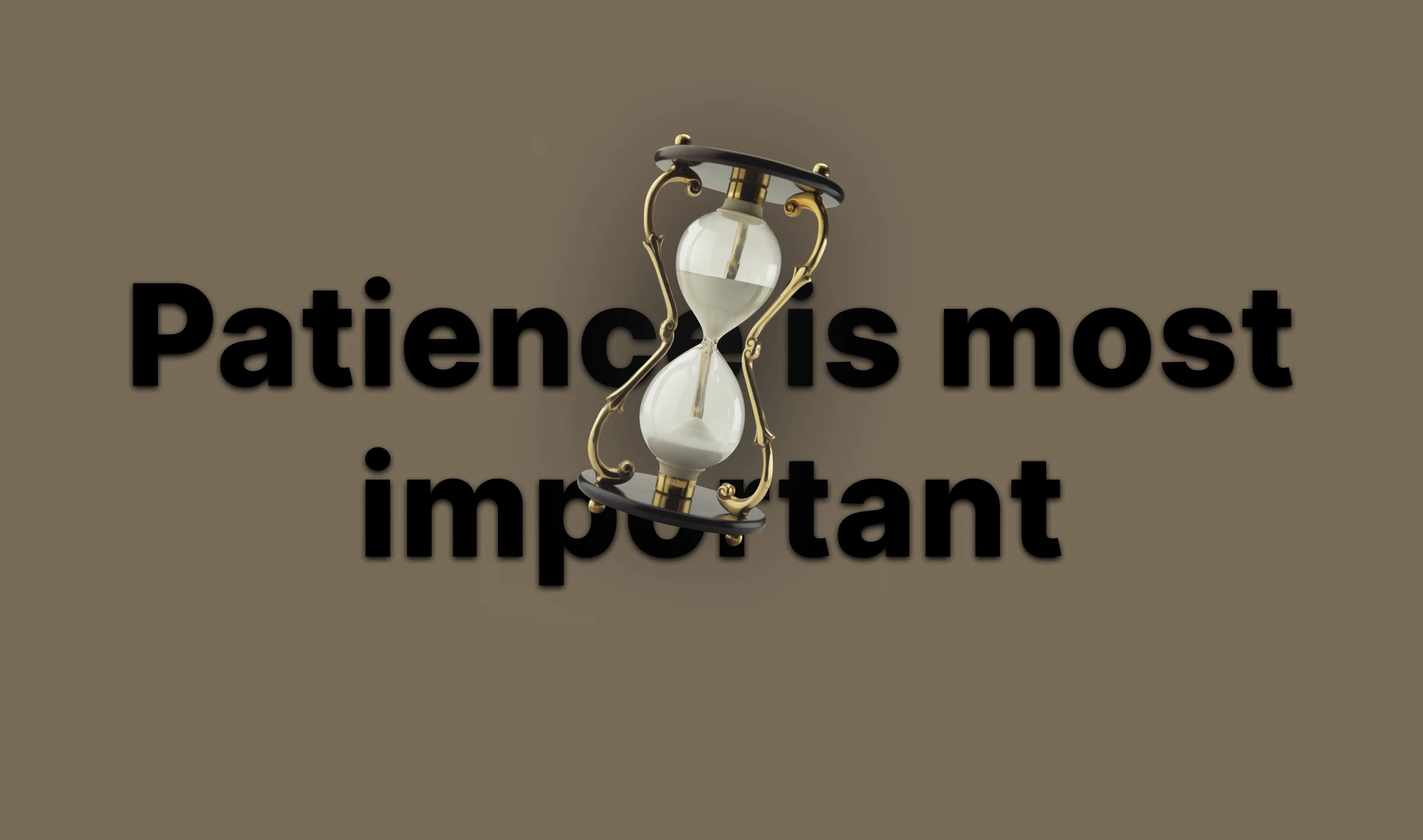
Mastery of any skill-whether or not it`s blogging, music, sports, or any innovative endeavor-needs patience, dedication, and steady effort. In an international in which we`re surrounded by memories of “in a single day success,” it`s clear to underestimate the quantity of time and exercise that real skill-constructing requires. Yet, the fact is that scalability is hardly ever performed in days, weeks, or maybe months. The “artwork of patience” in skill-constructing is as important as the exercise itself.
When we take a patient approach to developing our skills, we give ourselves permission to make mistakes, grow from them, and gradually improve, you want to think that good things take time. To find their voice, a painter might, for example, spend years honing their skill, experimenting with color, or researching various styles. Before a musician can confidently perform a composition, they must practice rhythm, harmonies, and scales for countless hours. To better their performance, athletes also spend years training, growing from mistakes, and pushing themselves to the maximum.
Dedicated exercise over the years doesn`t simply decorate the talent however additionally builds discipline, resilience, and intellectual strength. These features are as vital to mastery because of the technical abilities themselves. Those who include persistence discover ways to revel in the process, rejoice in small wins, and discover motives in consistent development in place of speeding to an end line.
When it comes to developing skills, the art of patience serves as a reminder that true mastery requires commitment, time, and a readiness to accept every step of the process. Quick wins will never compare to the permanent sense of accomplishment and joy that comes from this process, which enhances both the skill and the person using it.
Relationship Bonds Strengthen Over Time
Strong relationships are constructed now no longer in a single day however over time, through shared experiences, agree with, understanding, and true connection. The essence of a deep courting lies inside the potential to be gifted and supportive as humans navigate life`s demanding situations and have a good time its joys together. Bonds rooted in agreement with and mutual appreciation regularly emerge as extra resilient, fostering a connection that is comforting and empowering.
Trust is one of the most important factors that gradually improves relationships. It good things takes time to build trust; it requires constancy, integrity, and openness. The cornerstone of a long-lasting relationship is built on trust, which increases every time a friend or partner shows up, helps us, or keeps their word. Although mistakes are unavoidable, how people respond to them by offering an apology, showing forgiveness, and growing from them has a significant impact on building trust.
Understanding is any other layer that deepens over time. In the early tiers of a relationship, we may also recognize every other`s options and behavior on a floor level. However, as time goes on, we start to find out about every other`s values, goals, and beyond experiences, main to empathy and a deeper appreciation of the alternative person`s perspective. This know-how creates a secure area for vulnerability, in which human beings sense regular and valued for who they virtually are.
Shared experiences-whether or not they`re blissful milestones or hard challenges—bind human beings collectively via way of means of developing recollections and an experience of unity. Going through life`s ups and downs collectively fosters a completely unique connection and strengthens resilience inside the relationship. These reviews educate us to depend upon each other, reinforcing an experience of companionship and teamwork.
Relationships built on trust, understanding, and shared experiences eventually grow stronger and more reassuring, serving as a reminder that true connections take time to develop and are created via perseverance, hard work, and a shared commitment to personal development.
Health and Fitness
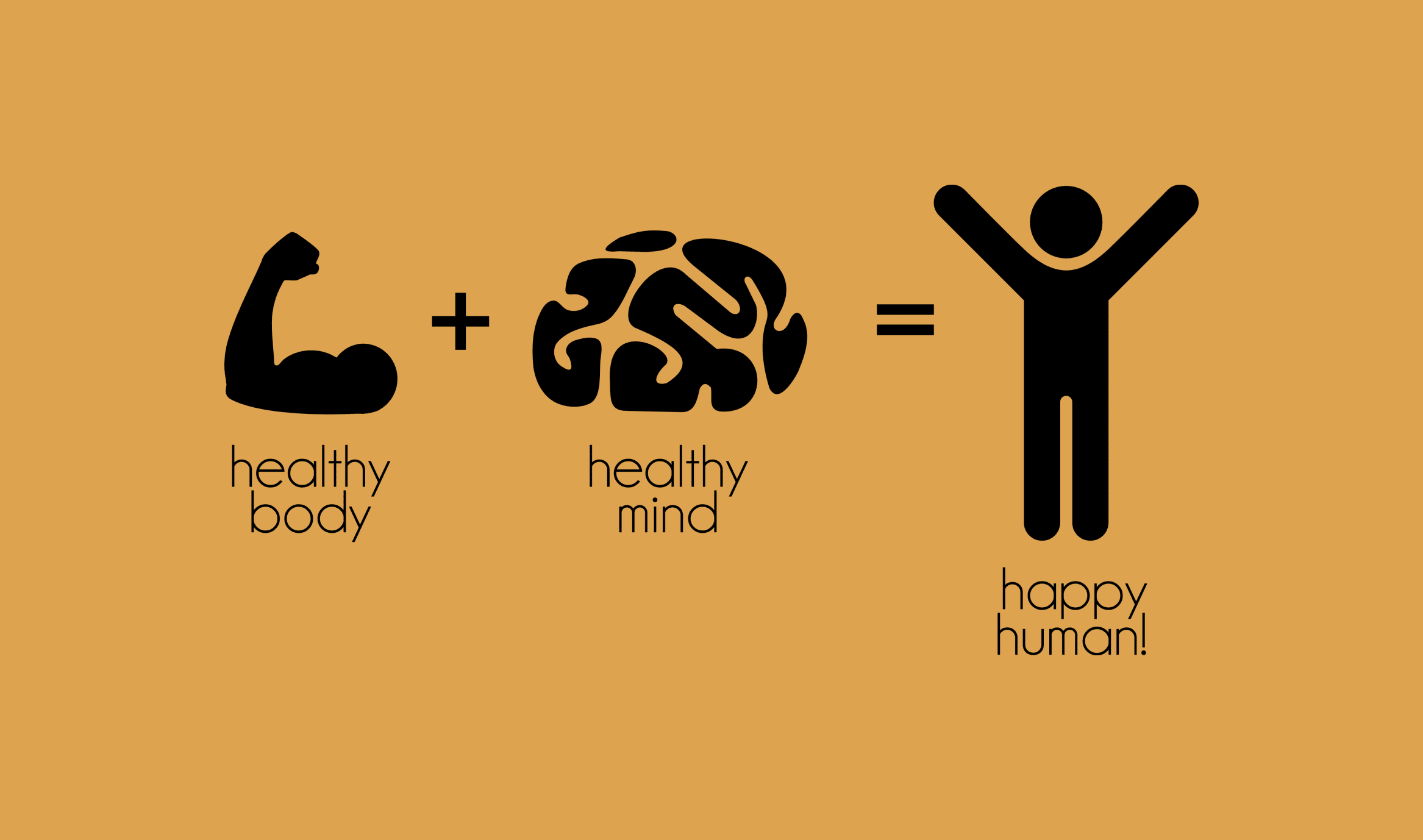
Achieving lasting fitness and health is an adventure that calls for regular attempts and a high-quality attitude over time. In today`s world, in which brief fixes and speedy outcomes are frequently advertised, it may be tempting to search for shortcuts. However, actual bodily health, intellectual well-being, and a wholesome way of life are constructed gradually. Small, regular adjustments in day-by-day exercises could make a huge distinction inside the lengthy run, presenting blessings that might be deep and lasting.
Physical Fitness Through Consistency
True physical fitness is not achieved in a matter of weeks. It is the outcome of months and years of consistent, deliberate movement. It takes time to gain muscle, boost endurance, or increase flexibility. Walking, running, lifting weights, or doing yoga are all regular exercise that help our bodies become stronger, more flexible, and more resilient over time. Regular exercise can also help avoid diabetes, high blood pressure, heart disease, and other health problems.
One vital factor to recollect is that even small quantities of motion every day can cause huge upgrades over time. You don`t want to workout for hours each day; instead, locate a hobby you revel in and stay with it. Over time, it turns into easier, and the outcomes emerge as noticeable. For instance, including a 30-minute stroll each day can enhance cardiovascular fitness and mood, supplying you with electricity for different components of your life.
Mental Well-being Takes Time to Develop
Consistent practice strengthens mental well-being, just as it does physical fitness. Our emotions can be greatly impacted by techniques like mindfulness, meditation, or just setting aside time each day to think and unwind. These behaviors enhance emotional equilibrium, boost concentration, and lessen stress.
Mental health additionally comes from placing healthful boundaries, getting sufficient sleep, and staying linked with supportive pals and family. Having wonderful relationships and handling strain in healthful approaches contribute substantially to a happy, balanced mind. Taking time every day to take care of our intellectual fitness is as crucial as bodily exercise. While the blessings may not be seen immediately, they collect over time, main to a greater non-violent and resilient mind.
The Power of a Balanced Lifestyle
Making good decisions every day is the key to leading a healthy lifestyle, which integrates mental and physical well-being. Good health is influenced by eating well-balanced meals, staying hydrated, and avoiding processed foods and high sugar. The goal of a healthy diet is to provide your body with the nutrition it needs to perform at its peak, not to follow rigid guidelines or deprive yourself. Over time, minor adjustments, like as increasing the amount of vegetables or reducing the consumption of sugary drinks, have a significant impact.
Sleep is another essential part of a balanced lifestyle. Good sleep allows our bodies to recover and keeps our minds sharp and ready for each day. Just like with diet and exercise, quality sleep contributes to our overall health and helps us manage stress better.
Consistency is Key
The key to lasting health and fitness is consistency. Small, fine movements repeated every day regularly result in real, sustainable changes. Rather than focusing totally on fast results, it`s vital to rejoice in every small victory alongside the journey. Building a wholesome lifestyle mustn't be perfect—there'll necessarily be days whilst we leave out a workout, bask in a much less nutritious meal, or sense crushed through stress. These moments are natural, and they don`t outline our progress. What honestly subjects us is our capacity to get a return on track, make more healthy choices, and move forward. Each small step, every selection to select better, contributes to our common well-being. Over time, those small, steady efforts upload up, shaping a balanced, more healthy lifestyle that is resilient to setbacks and constructed to last. Remember, persistence and staying power are the muse of wholesome, satisfied lifestyles.
Gardening as a Metaphor for Growth
A great metaphor for personal development is gardening. Our path to self-improvement requires the same attention, perseverance, and patience as a garden. Every plant in a garden needs time to flourish as well as other forms of care, such as sunlight, water, and the right soil. In a similar vein, personal development entails investing time and effort into fostering various aspects of ourselves.
With optimism, seeds are sown in a garden. Although nothing appears to be happening at first, roots are developing beneath the earth in preparation for growth. The seeds we sow in our life, such as establishing objectives or forming new routines, may not bear fruit right away, but they are nonetheless significant actions. Progress is still occurring even if we don't immediately notice it. Growth frequently begins slowly, almost imperceptibly, but eventually becomes apparent.
Taking care of a lawn additionally calls for everyday attention. We want to water plants, ensure they get sufficient sunlight and cast off any weeds that could prevent them from growing. Similarly, the non-public boom includes nurturing our minds and hearts and staying aware of what enables us to develop and what is probably retaining us. We may also want to cast off “weeds” like poor conduct or proscribing ideals that save us from accomplishing our potential.
Another crucial trait for gardening and personal development is patience. Like plants, humans don't grow overnight. Real growth cannot be hurried; it requires time. Similar to a plant's stages of sprouting, budding, flowering, and occasionally fruiting, our path consists of learning, adversity, and finally thriving. It's important to trust the process.
Gardening also teaches us that challenges are a part of growth. Weather changes, pests come along, and sometimes plants don’t thrive as expected. In our lives, setbacks and obstacles can feel like those challenges. They may slow us down, but they don’t have to stop us. Instead, they help us learn, adjust, and grow stronger.
Finally, the rewards of gardening, like the ones of private increase, are deeply fulfilling. After all of the tough paintings, endurance, and care, a lawn blooms beautifully, providing color, fragrance, and life. Similarly, the result of nurturing ourselves—of putting in the time and effort—is a fuller, greater resilient self. Personal increase, like a lawn, brings joy, strength, and success that makes all of the paintings worthwhile.
In each gardening and life, time, attention, and patience create something beautiful. By treating ourselves like a lawn, we can include the adventure of increasing with endurance and care, trusting that every step brings us in the direction of blooming fully.
Career Progression and Professional Success
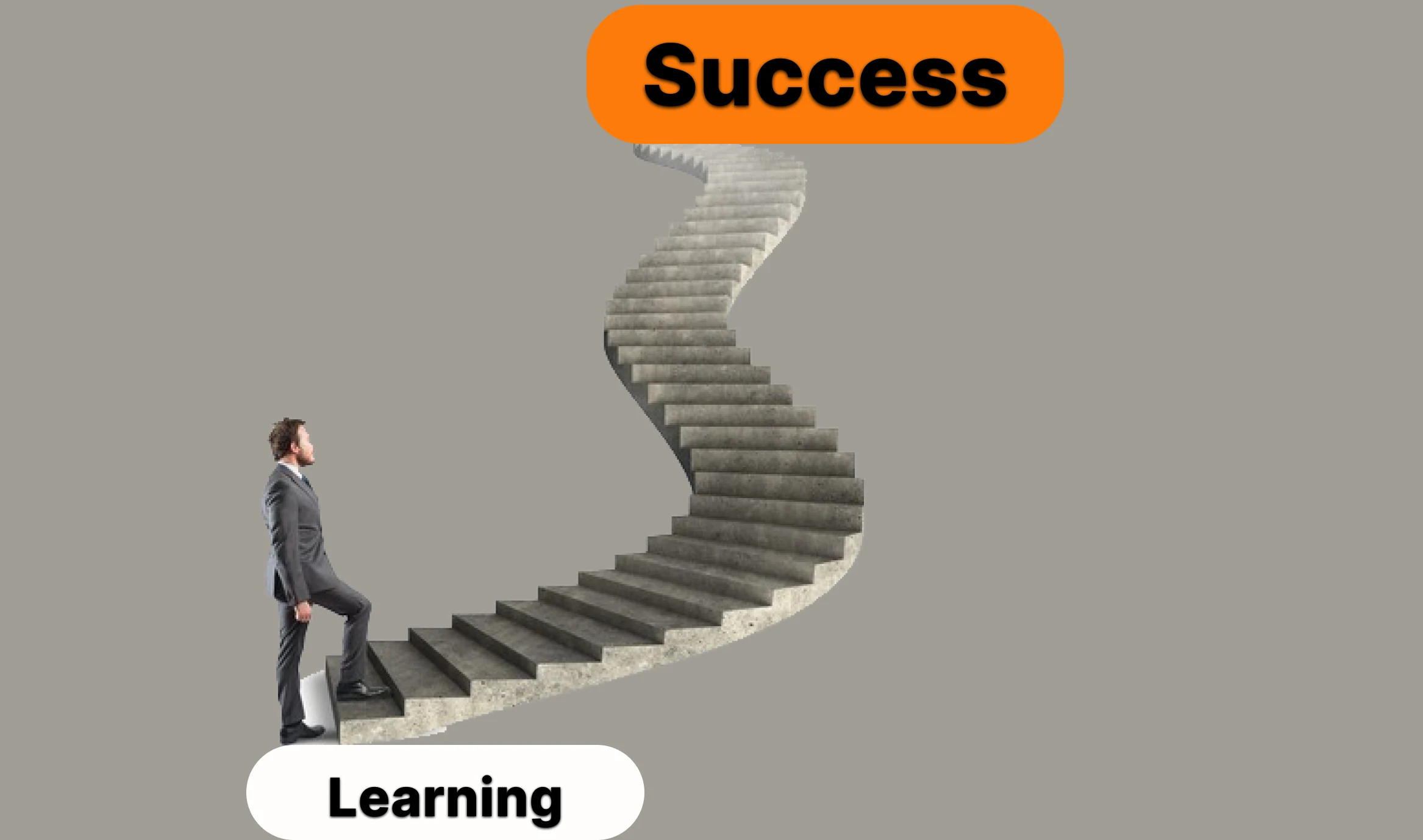
The pursuit of professional achievement and career advancement depends on perseverance, commitment, and lifelong learning. To thrive, a profession needs ongoing care, much like a plant requires time, water, and sunlight. Long-term skill development, perseverance, and problem-solving are the keys to obtaining professional success.
One of the maximum crucial components for professional increase is learning. The global of labor is continuously changing, with new competencies, technologies, and approaches of questioning rising each day. To live relevant, it`s critical to preserve learning. This doesn`t constantly suggest returning to high school or taking formal courses; it may be as easy as reading, asking questions, and working towards new competencies at the job. Each little bit of know-how contributes to our increase, and over time, this know-how builds into information that`s precious in our careers.
Dedication is another key factor. Progress in a career rarely happens by chance; it’s often the result of steady, focused effort. Showing up consistently, being reliable, and putting in the work all contribute to a positive reputation. When others see that we’re dedicated, they’re more likely to trust us with bigger responsibilities. Dedication also means setting goals and working steadily toward them, even when the path isn’t always smooth or clear.
Resilience performs a critical position in long-term professional success. Just like there are ups and downs in any lifestyle journey, there are highs and lows in a profession. Sometimes, we can also additionally face setbacks, like lacking a promotion, managing a hard project, or running in a hard environment. Resilience enables us to get better from those setbacks. Instead of giving up, resilient specialists study setbacks as possibilities to learn, improve, and develop stronger. Overcoming demanding situations builds self-assurance and makes us higher organized for destiny obstacles
A career that thrives over time is based on education, commitment, and perseverance. Professionals who make time for their development, exhibit dedication, and adjust to change are frequently the ones who achieve significant, satisfying success. Every action, no matter how minor or significant, strengthens the foundation for a career.
Furthermore, the adventure of professional development may be deeply rewarding. The self-assurance that comes from overcoming challenges, the pleasure of accomplishing goals, and the honor earned from others all make contributions to a satisfying expert life. While brief successes may also seem exciting, they`re regularly short-lived. Real success—the type that lasts—comes from years of learning, effort, and persistence.
In the end, professional development is like developing a strong, tall tree: it calls for time, care, and willingness to climate storms. With consistent learning, dedication, and resilience, a profession can develop into something significant and lasting.
Building a Strong Brand or Business

Creating a strong brand or business is a process that demands time, patience, and consistent effort. In our fast-paced world, where many companies chase instant success, it’s easy to overlook the fact that respected brands are developed gradually. Much like a house requires a strong foundation, a business needs a core of trust and quality to thrive over time.
Building a strong brand reputation begins with providing a high-quality product or service. Customers tend to remember brands that fulfill or surpass their expectations, and consistently delivering quality fosters trust over time. This trust lays the groundwork for customer loyalty, encouraging them to return, recommend, and remain devoted to the brand.
Another key factor is consistency. Small, consistent actions—like excellent customer service, reliable delivery, or consistent brand messaging—help people remember the brand. Brands that stay true to their values and provide a consistent experience become recognizable and reliable to customers. Even small steps, when repeated, build a strong brand image over time.
Building a brand also requires a focus on relationship building. Engaging with customers, listening to their feedback, and making improvements show that the brand values its customers. People are more likely to support brands that treat them well and prioritize their needs.
Growth might take time, but every positive experience, every happy customer, and every enhanced product contributes to the brand's reputation. When challenges come up, a strong brand learns from them and adjusts, showcasing its resilience.
In the end, creating a respected brand or business takes time(remembering good things takes time), effort, and a commitment to quality and consistency. Each small, consistent step-whether improving products, responding to customers, or staying true to brand values strengthens the brand’s reputation. Over time, those efforts create an enterprise that clients agree with and respect, main to lasting success.
Mastery in Learning and Education

Learning and education mastery requires patience, commitment, and curiosity. Gaining a thorough understanding of any subject takes years of study, exploration, practice, and idea connecting. Surface knowledge can be acquired quickly, but true mastery requires moving beyond the fundamentals and gaining insights that can only be attained with perseverance and steady work.
Basic ideas and information are frequently where we start when learning something new. It may seem like we're moving quickly at this point. But the more we study the topic, the more we realize how much more there is to know. The foundation is strengthened by each new layer of knowledge, which also reveals the subject's true complexity. We become increasingly aware of how much we still don't understand as we gain more knowledge.
To attain mastery, consistent practice is essential. Engaging with what we learn strengthens our understanding and allows us to hone our skills gradually. Take learning a musical instrument, for example; it’s not solely about grasping music theory but also dedicating countless hours to practice, perfecting techniques, and learning from errors. This ongoing effort shifts us from merely “knowing” to truly “doing.” The same principle applies to areas like math, science, or languages, where practice turns knowledge into both skill and self-assurance.
Another important part of mastery is curiosity and exploration. A true master doesn’t just stop once they reach a certain level; they continue to ask questions, explore new ideas, and seek deeper understanding. Curiosity leads to discovery, and exploration brings new insights that push the learner further. Mastery in any field requires a love for learning that motivates us to keep going, even when the material becomes challenging.
Patience is just as important as practice and curiosity when it comes to learning. Gaining a deep understanding takes time and effort. Someone dedicated to mastering a skill knows that they will face challenges, confusion, and sometimes failure along the way. These experiences are a normal part of learning. Rather than throwing in the towel, a dedicated learner views these moments as chances to develop and enhance their abilities. Every setback serves as a valuable lesson, contributing to their broader knowledge.
Over time, the combination of consistent study, regular practice, curiosity, and patience leads to mastery. This profound level of knowledge and skill takes time to develop; it is cultivated gradually over years of dedicated learning. Mastery in education goes beyond merely acquiring facts; it involves reaching a point of understanding and insight that enables an individual to apply their knowledge effectively, think critically, and keep evolving in their area of expertise. This is the genuine benefit of mastering any subject.
Personal Growth and Self-Improvement
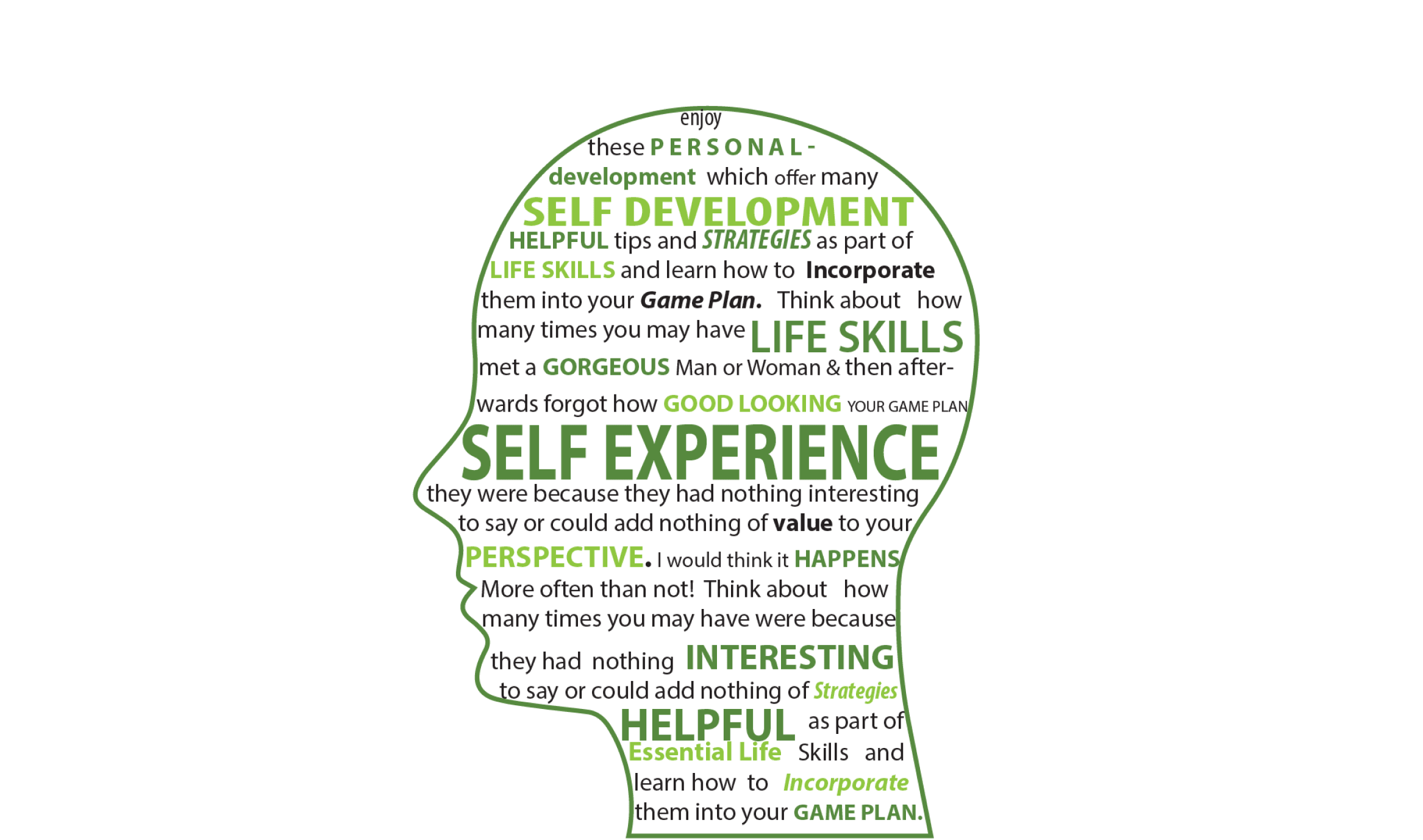
Personal growth and self-improvement are gradual journeys that evolve through consistent, small daily steps. It’s easy to think of growth as happening in big, defining moments, but real transformation often comes from subtle changes that accumulate over time. Building healthy habits, shifting our mindset, and being patient with ourselves are all key ingredients in achieving meaningful self-improvement.
Understanding that personal growth is a journey rather than a destination is one of the most crucial components of this process. Many people begin with aspirational objectives, such as wanting to be healthier, more self-assured, or more proficient in a particular field, but achieving these goals takes time and perseverance. It is beneficial to think of self-improvement as a sequence of continuous, daily activities rather than as a task to be completed. Focusing on tiny, doable adjustments makes progress less daunting and more attainable. These adjustments could be as easy as setting positive intentions for a short while each morning, reading for ten minutes every day, or practicing gratitude.
Habits play a big role in personal growth. Positive change is rooted in the establishment of good habits, whereas detrimental habits can impede our progress. Seemingly insignificant daily practices, such as staying adequately hydrated, engaging in mindfulness, or dedicating time to physical activity, may appear trivial; however, over weeks, months, and years, these practices significantly influence our overall well-being and mental outlook. The advantage of small habits lies in their low demand for effort, yet when performed consistently, they foster enduring transformation. Much like a solitary drop of water can gradually fill a container, each minor action plays a role in shaping the individual we are evolving into.
Personal growth also requires us to reflect and adapt. It's not only about forming and maintaining habits; it's also about knowing why we do what we do and being willing to change as we go. We can identify what works and what doesn't for us by reflecting on our experiences. Making decisions that better reflect our values and objectives requires us to take the time to comprehend our own ideas and feelings. Given the unpredictability of life and the complexity of the path to self-improvement, this adaptability is crucial. We might occasionally need to take a break to refuel, alter our viewpoint, or modify our strategy.
Patience is another essential quality in personal growth. Frequently, we anticipate rapid outcomes and may feel disheartened when immediate transformations are not evident. Nevertheless, enduring personal development requires time. It resembles the process of sowing a seed and tending to it daily. A seed does not transform into a tree in a single night; it necessitates time, attention, and suitable circumstances. In the same way, the incremental steps we undertake to enhance ourselves may not produce instant results, but they will ultimately contribute to a more robust and resilient individual. Cultivating patience allows us to relish the journey and recognize the progress we achieve, no matter how minor it may appear.
Lastly, celebrating small victories is important for motivation and self-worth. Personal growth is made up of small steps, and acknowledging each step forward, no matter how small can boost our confidence. Every small win reminds us that we are capable of growth and change, which builds momentum to keep moving forward. We permit ourselves to develop without passing judgment when we prioritize progress over perfection.
Ultimately, personal development and self-enhancement revolve around creating a life that instills a sense of pride, achieved incrementally. By cultivating daily practices, engaging in self-reflection, exercising patience, and acknowledging minor achievements, we progressively evolve into our most authentic selves. This continuous journey enhances our existence, imparting lessons that foster kindness, wisdom, and resilience as we advance.
Financial Stability and Investment Growth
Many people want to accumulate wealth and become financially stable, but achieving these goals takes time and effort. Real financial stability is developed with steady saving, astute investing, and a methodical attitude to progress rather than through unexpected riches or reckless endeavors. We may let our money work for us and progressively increase our wealth and security over time by adhering to a consistent financial plan.
One of the most influential concepts in attaining financial stability is the principle of compounding. When we save or invest funds, we are not merely increasing our wealth; we are also enabling our money to grow independently. For instance, when we invest a certain amount and generate interest, that interest is added to the principal. As time progresses, the investment begins to earn interest on the new total, rather than solely on the initial amount. This compounding effect can result in considerable growth, particularly if we commence early and allow it to mature. Compounding can convert even small, consistent contributions into significant wealth.
Consistent saving is another cornerstone of financial stability. Setting away a modest amount of money each month helps us develop a saving habit that gets stronger over time. These consistent savings can build up to a safety net that offers comfort and a buffer against unforeseen costs. Making savings automated also relieves the burden of having to worry about it all the time, letting our wealth increase organically with every paycheck.
Investing adds another layer of potential growth. Unlike saving, which keeps money safe but may yield only modest returns, investing allows money to grow faster by placing it in assets that can appreciate over time, such as stocks, bonds, or real estate. Successful investing necessitates patience, as market fluctuations can lead to delays in realizing returns. By focusing on long-term goals rather than short-term gains, we can ride out market ups and downs, taking advantage of the overall trend of growth.
Achieving financial stability involves both making prudent, long-term financial decisions and building money. Long-term stability is facilitated by avoiding needless debt, living within our means, and establishing reasonable goals. We get closer to financial freedom with each wise decision we make in addition to consistent investment and saving.
Time and consistency are ultimately the cornerstones upon which stability and prosperity are based. We build a solid, safe, and robust financial future by consistently saving, making prudent investments, and letting time do its magic through compounding. Like all growth, financial success comes to those who are persistent, disciplined, and dedicated to a long-term goal.
Creativity in Writing or Art

In writing, art, and other creative endeavors, creativity is a process that develops over time. It takes perseverance, experimentation, and a readiness to change to establish a distinctive style or produce work that profoundly connects with others. It's easy to believe that creativity comes easily, like an epiphany, yet genuine artistry is typically the result of many hours of work, introspection, and perseverance.
Discovering a Unique Style
A fundamental element of creative endeavors is the identification of a personal style—whether it be a distinctive voice in writing, a recognizable technique in painting, or a singular perspective in photography or design. The journey to uncover this unique style is not instantaneous. It typically commences with a period of experimentation, during which we emulate the styles of artists we admire and explore various techniques, colors, or formats. This stage of "imitation" holds significant value, as it equips us with essential skills and exposes us to diverse viewpoints. As we continue to investigate what resonates with us and what does not, our preferences and influences gradually merge, ultimately crafting a style that feels genuinely representative of ourselves.
Crafting Meaningful Work
Creating work that has depth and meaning requires more than technical skill; It necessitates an awareness of connection, storytelling, and emotion. For an artist, this could mean selecting colors, shapes, and textures that speak beyond the surface, while for a writer, it could mean learning how to express complicated feelings in straightforward language. It takes expertise and patience to reach this level of comprehension. Our creative expression is frequently shaped by life itself. Our work is rich with layers and viewpoints that resonate with others because it reflects our personal experiences, feelings, and personal development.
The Importance of Consistent Practice
Consistency is essential for creative growth. Just as athletes need to train regularly to build strength, creative individuals need consistent practice to refine their skills. Writing a few lines, drawing a scene, or experimenting with new materials are all examples of daily or frequent practice that aids in becoming more comfortable with the art. It gets easier to communicate concepts effectively and concisely the more we practice. Regular practice also reduces the pressure of having to create something “perfect” each time; instead, it emphasizes the process of exploration, where each piece is a step forward.
Embracing Mistakes and Learning
Making mistakes is a natural part of the creative process. Whether it's a color that didn't work, a plot that didn't work, or a piece that didn't connect as we had hoped, every mistake teaches us something important. Rather than fearing mistakes, creatives who embrace them find new ways to grow and innovate. Mistakes can spark fresh ideas or lead us to paths we hadn’t considered, enriching our work and expanding our style. These minor "failures" eventually become a part of our individual creative process, strengthening and elevating our style.
Patience and Persistence
Developing a unique style or creating meaningful work requires patience and persistence. Creativity isn’t a straight line; it has ebbs and flows, moments of inspiration, and periods of struggle. It is common to experience frustration when results are not immediately apparent; however, exceptional art and writing frequently necessitate a deeper exploration, urging us to move beyond superficiality to reveal our genuine intentions. This journey demands time, yet it is precisely this effort that contributes to the authenticity and lasting impact of the work.
Time, patience, and persistence are essential elements that shape lasting success across various areas of life. Little, regular acts add up over time to change habits and develop resilience in personal growth. Years of exploration, experience, and refinement are necessary for the development of a distinctive style and significant work in creative endeavors. Consistent saving, astute investing, and the force of compounding—which transforms hard work into significant wealth—are the keys to financial stability. Careers blossom through long-term dedication, learning, and the ability to adapt and grow with each experience. Similarly, relationships deepen over time as trust, understanding, and shared memories create lasting bonds
Each area serves as an example of how real rewards come from steady growth rather than sudden gratification. Perseverance and patience enable us to overcome obstacles, acknowledge minor triumphs, and remain dedicated to our objectives. Over time, these endeavors produce outcomes that are significant, durable, and satisfying.
